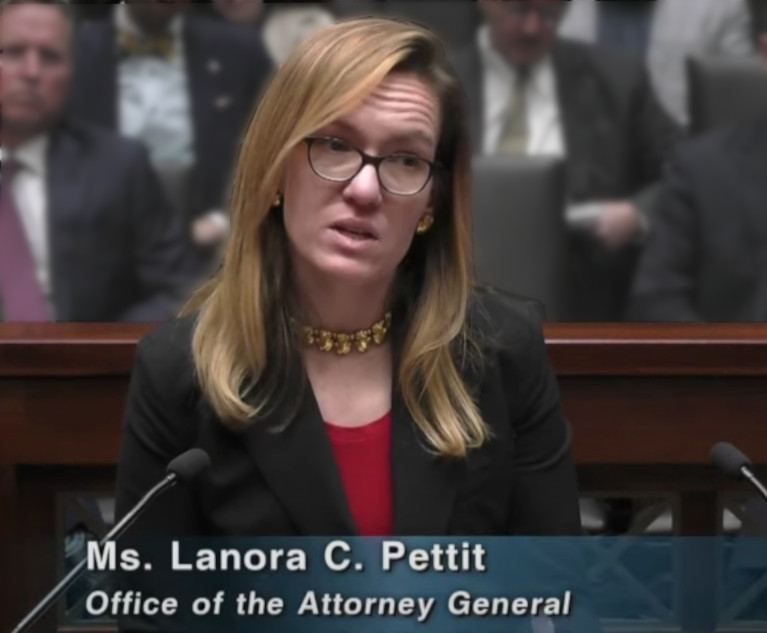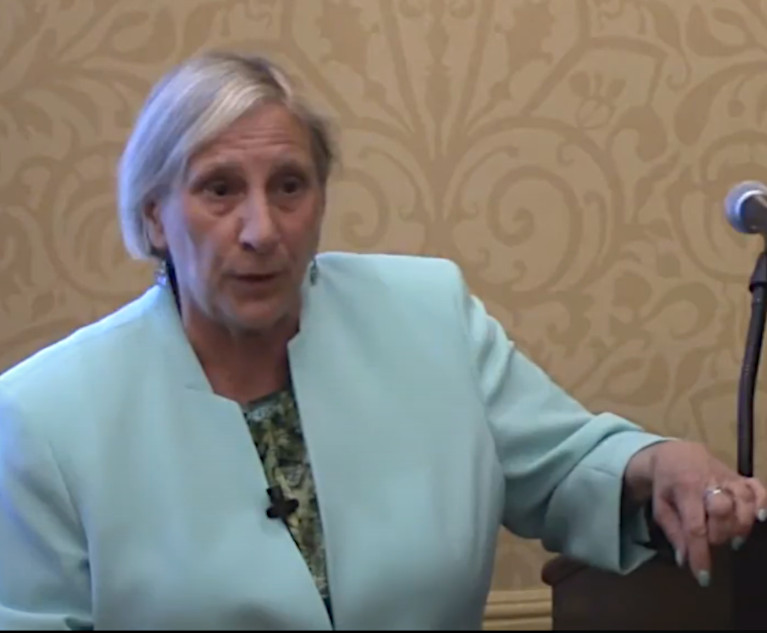Texas Judge Sanctioned for Endorsing Candidate—for Electric Cooperative Seat
A constitutional county court judge in Central Texas was sanctioned for publicly endorsing a candidate, even though the candidate wasn't running for a "public office," because the jurist still lent the prestige of his office to advance the candidate's private interests.
October 28, 2019 at 03:24 PM
4 minute read
 Photo: Hermosawave
Photo: Hermosawave
In the midst of election season, a new court ruling reminds Texas judges that ethical rules prohibit them from endorsing other candidates—no matter what office these candidates seek.
A special court of review has publicly admonished Burnet County Judge James Oakley for endorsing a candidate running for the Pedernales Electric Cooperative. Although that position doesn't actually count as a "public office," which the state's ethics rules prohibit judges from endorsing, Oakley's sanction came from another rule violation for lending the prestige of his judicial title to serve the private interests of the other candidate.
"I don't believe that the judicial conduct commission should have the ability to take away my constitutional right of free speech, or anyone's, for that matter," said Oakley, a nonlawyer whose duties are mainly administrative to preside over Burnet County's commissioner's court.
But as a constitutional county judge, he also has some judicial duties to preside over uncontested probate and guardianship proceedings, explained the Oct. 25 ruling by special court Justice Greg Perkes of the 13th Court of Appeals, joined by Justices Meagan Hassan of the 14th Court of Appeals and Robbie Partida-Kipness of the Fifth Court of Appeals.
Oakley is also a board member of the Pedernales Electric Cooperative, a nonprofit utility company. He publicly endorsed the campaign of Donna Holland Wilcox to run for the same board, and she used the judge's name, title and photo on her campaign materials. If she had won, the position would have paid a $36,000 stipend annually. But she lost.
Serving on the Pedernales Electric Cooperative's board wouldn't count as a "public office" under the Texas Code of Judicial Conduct, the ruling noted. That's an important distinction, since Canon 5(2) prohibits a judge from allowing "another candidate for any public office" to use his name or likeness as an endorsement.
Yet the commission charged Oakley with violating another rule that says a judge can't "lend the prestige of judicial office to advance the private interests of the judge or others."
Oakley argued that Wilcox didn't stand to gain any "private interests," because if elected to the PEC board, she wouldn't have gotten any secret or confidential benefits. The special court determined that the meaning of "private interests" in the rule was broader. Wilcox stood to benefit individually from her election, and so it did constitute a private interest, the opinion said.
Also, he argued that her $36,000 annual stipend counted as compensation paid to an elected official, and not a private interest, which is a precedent set in In re Hecht in 2006. In that case, then-Texas Supreme Court Justice Nathan Hecht, who is now chief justice, was sanctioned for publicly supporting Harriet Miers as a nominee to the U.S. Supreme Court. The sanction was overturned by a special court of review, which found that a Supreme Court justice's lifetime tenure and salary safeguard the judiciary's independence, so the benefits serve the public's interest.
In Oakley's case, Hecht did not apply, the opinion said. The Pedernales Electric Cooperative board isn't a public office, and Wilcox getting a stipend to serve there did not serve a greater public interest, said the ruling.
"Instead, it constituted a 'private interest' as the term is commonly understood in the context of Canon 2B," the opinion said.
The court determined that a public admonition was the appropriate sanction for the misconduct.
Oakley said he disagrees with the ruling.
"In Justice Hecht's case back then in 2006, if a Texas Supreme Court justice is found to be OK to endorse a candidate for the United States Supreme Court, then certainly a county judge in Texas—a constitutional county judge—should be able to endorse somebody for an electric cooperative seat," he said.
Jacqueline Habersham, interim executive director of the judicial conduct commission, declined to comment.
Read the opinion:
This content has been archived. It is available through our partners, LexisNexis® and Bloomberg Law.
To view this content, please continue to their sites.
Not a Lexis Subscriber?
Subscribe Now
Not a Bloomberg Law Subscriber?
Subscribe Now
NOT FOR REPRINT
© 2025 ALM Global, LLC, All Rights Reserved. Request academic re-use from www.copyright.com. All other uses, submit a request to [email protected]. For more information visit Asset & Logo Licensing.
You Might Like
View All
Conspiracy Suits Against Quinn Emanuel, Roc Nation Moved to Federal District Court

JCPenney Seeks Return of More Than $1.1M From Jackson Walker For Bankruptcy Work
3 minute read

HUD Charges Texas HOA With Housing Discrimination in Last Days of Biden Administration
5 minute readTrending Stories
- 1Uber Files RICO Suit Against Plaintiff-Side Firms Alleging Fraudulent Injury Claims
- 2The Law Firm Disrupted: Scrutinizing the Elephant More Than the Mouse
- 3Inherent Diminished Value Damages Unavailable to 3rd-Party Claimants, Court Says
- 4Pa. Defense Firm Sued by Client Over Ex-Eagles Player's $43.5M Med Mal Win
- 5Losses Mount at Morris Manning, but Departing Ex-Chair Stays Bullish About His Old Firm's Future
Who Got The Work
J. Brugh Lower of Gibbons has entered an appearance for industrial equipment supplier Devco Corporation in a pending trademark infringement lawsuit. The suit, accusing the defendant of selling knock-off Graco products, was filed Dec. 18 in New Jersey District Court by Rivkin Radler on behalf of Graco Inc. and Graco Minnesota. The case, assigned to U.S. District Judge Zahid N. Quraishi, is 3:24-cv-11294, Graco Inc. et al v. Devco Corporation.
Who Got The Work
Rebecca Maller-Stein and Kent A. Yalowitz of Arnold & Porter Kaye Scholer have entered their appearances for Hanaco Venture Capital and its executives, Lior Prosor and David Frankel, in a pending securities lawsuit. The action, filed on Dec. 24 in New York Southern District Court by Zell, Aron & Co. on behalf of Goldeneye Advisors, accuses the defendants of negligently and fraudulently managing the plaintiff's $1 million investment. The case, assigned to U.S. District Judge Vernon S. Broderick, is 1:24-cv-09918, Goldeneye Advisors, LLC v. Hanaco Venture Capital, Ltd. et al.
Who Got The Work
Attorneys from A&O Shearman has stepped in as defense counsel for Toronto-Dominion Bank and other defendants in a pending securities class action. The suit, filed Dec. 11 in New York Southern District Court by Bleichmar Fonti & Auld, accuses the defendants of concealing the bank's 'pervasive' deficiencies in regards to its compliance with the Bank Secrecy Act and the quality of its anti-money laundering controls. The case, assigned to U.S. District Judge Arun Subramanian, is 1:24-cv-09445, Gonzalez v. The Toronto-Dominion Bank et al.
Who Got The Work
Crown Castle International, a Pennsylvania company providing shared communications infrastructure, has turned to Luke D. Wolf of Gordon Rees Scully Mansukhani to fend off a pending breach-of-contract lawsuit. The court action, filed Nov. 25 in Michigan Eastern District Court by Hooper Hathaway PC on behalf of The Town Residences LLC, accuses Crown Castle of failing to transfer approximately $30,000 in utility payments from T-Mobile in breach of a roof-top lease and assignment agreement. The case, assigned to U.S. District Judge Susan K. Declercq, is 2:24-cv-13131, The Town Residences LLC v. T-Mobile US, Inc. et al.
Who Got The Work
Wilfred P. Coronato and Daniel M. Schwartz of McCarter & English have stepped in as defense counsel to Electrolux Home Products Inc. in a pending product liability lawsuit. The court action, filed Nov. 26 in New York Eastern District Court by Poulos Lopiccolo PC and Nagel Rice LLP on behalf of David Stern, alleges that the defendant's refrigerators’ drawers and shelving repeatedly break and fall apart within months after purchase. The case, assigned to U.S. District Judge Joan M. Azrack, is 2:24-cv-08204, Stern v. Electrolux Home Products, Inc.
Featured Firms
Law Offices of Gary Martin Hays & Associates, P.C.
(470) 294-1674
Law Offices of Mark E. Salomone
(857) 444-6468
Smith & Hassler
(713) 739-1250






